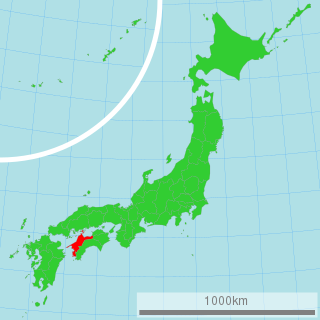
Akiyama Saneyuki was a Meiji-period career officer in the Imperial Japanese Navy. He was famous as a planner of Battle of Tsushima in the Russo-Japanese War. The Japanese general Akiyama Yoshifuru was his elder brother and the Japanese politician Hisako Ōishi was his granddaughter.
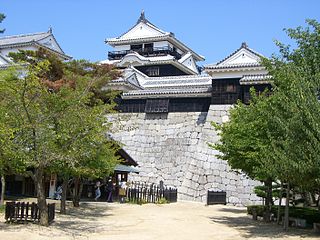
Matsuyama Castle is a flatland-mountain castle that was built in 1603 on Mount Katsuyama, whose height is 132 meters, in Matsuyama city in Ehime Prefecture.

Kenichi Matsuyama, real name Kenichi Matsuyama, is a Japanese actor.

Matsuyama Airport is an airport located 3 NM west southwest of Matsuyama, Ehime, Japan.
Chiharu Matsuyama is a Japanese folk singer and songwriter.

Iyo-Saijō Station is a railway station on the Yosan Line in Saijō, Ehime Prefecture, Japan. It is operated by JR Shikoku and has the station number "Y31". It is the main station of the city of Saijō and a major terminal on the Yosan Line with many train services beginning or ending here.
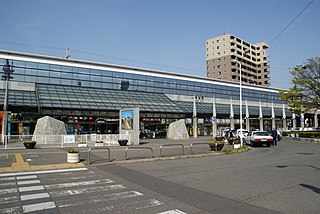
Imabari Station is a railway station on the Yosan Line in Imabari, Ehime Prefecture, Japan. It is operated by JR Shikoku and has the station number "Y36".
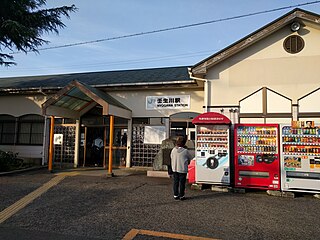
Nyūgawa Station is a railway station in Saijō, Ehime Prefecture, Japan. It is operated by JR Shikoku and has the station number "Y36".

Horie Station is a railway station on the Yosan Line in Matsuyama, Ehime Prefecture, Japan. It is operated by JR Shikoku and has the station number "Y52".

Ichitsubo Station is a railway station on the Yosan Line in Matsuyama, Ehime Prefecture, Japan. It is operated by JR Shikoku and has the station number "U01". The station is also called No-Ball Station named after Noboru (昇), the name of a haiku poet, Masaoka Shiki, who spent his childhood in Matsuyama.
Misao Tamai was a Japanese football player.
Yoshiyuki Matsuyama is a former Japanese football player. He played for Japan national team. His brother Hiroaki Matsuyama is also former footballer.
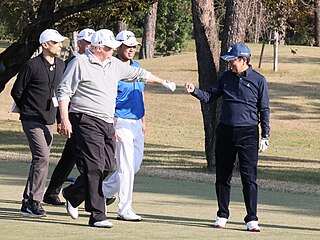
Hideki Matsuyama is a Japanese professional golfer. He won the Asian Amateur Championship in 2010 and 2011. He is a five-time PGA Tour winner, and an eight-time Japan Golf Tour winner. On 19 June 2017, Matsuyama became the world No. 2-ranked player on the Official World Golf Ranking after his runner-up finish at the 2017 U.S. Open.

Postcard is a 2010 Japanese drama film written and directed by Kaneto Shindo. It was Shindo's last film before his death in 2012 at age 100. The film is set during and after the Second World War, and it deals with the effect on families of the death of soldiers. It is loosely based on director Shindo's wartime experiences.

Shiori Tamai is a Japanese idol, a member of the girl group Momoiro Clover Z. As of December 2012, she is currently voice acting in the Nippon Television series Akumu-chan as a personage from the dreams of Keiko Kitagawa's character.
Matsuyama (松山) is a Japanese surname. Notable people with the surname include:

Akakichi no Eleven is manga series written by Ikki Kajiwara with drawings by Mitsuyoshi Sonoda. An anime adaption directed by Ken Yamada and produced by Kimio Ikeda, Hiroshi Mishima and Takahashi Noboyuki for Tokyo TV Doga aired between 1970 and 1971, which consists of 52 episodes lasting about 24 minutes. The series aired in Japan on Nippon Television from 13 April 1970 to 5 April 1971, every Monday. In Italy it was broadcast for the first time in 1982, through local TV stations. Other transmissions aired on Super 3, Naples Channel 21 and TMC, with a different assembly of the opening theme and the end, and was better known by the title "ARRIVANO I SUPERBOYS". It is the first anime dedicated to soccer. It gained popularity among male soccer players at the time. In addition, it has been pointed out that the emphasis on spirit theory, technology commentary and had been neglected.
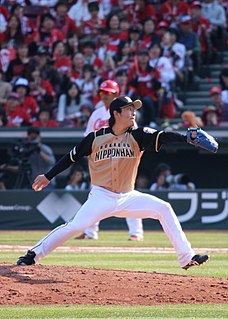
Taishō Tamai is a professional Japanese baseball player. He plays pitcher for the Hokkaido Nippon-Ham Fighters.

